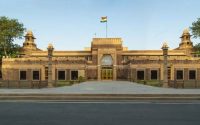$100 Website Offer
Get your personal website + domain for just $100.
Limited Time Offer!
Claim Your Website NowExplainer: Why Gujjars in Rajasthan Are Protesting Over Reservations Again
Source:-https://thewire.in
Jaipur: A year after the Ashok Gehlot-led Congress government in Rajasthan extended 5% reservation to the Gujjar community, along with four other communities, in public employment and education institutions, Gujjars led by Kirori Singh Bainsla on Saturday gathered at a community mahapanchayat in Bharatpur, demanding that the government accede to its reservation demands.
This repeated demand for reservation, despite the enactment of The Rajasthan Backward Classes (Reservation of Seats in Educational Institutions in the State and of Appointments and Posts in Services under the State) (Amendment) Act, 2019, which provides 5% reservation to the Gujjar community, is due to the legal impasse over this law.
The next hearing for the petition challenging the 2019 Act is October 21, and the Gujjar community is fearful that the judgment will not be in its favour.
A protracted legal battle
Following massive protests from the Gujjar community in Rajasthan in 2008, the state government enacted the Rajasthan Schedule Castes, Scheduled Tribes, Backward Classes, Special Backward Classes and Economically Backward Classes (Reservation of Seats in Educational Institutions in the state and of Appointment and Posts in Services under the State) Act, 2008.
However, the reservations under this Act were challenged because total reservations in the state exceeded the 50% ceiling. On December 22, 2010, the Rajasthan high court stayed the relevant sections of the 2008 Act which enabled the state government to notify the percentage of reservation for the five communities. The court further directed the government to undertake a study to analyse the backwardness of these communities.
In November, 2012, the Rajasthan state backward classes commission under the chairmanship of Justice I.S. Israni submitted a report in favour of providing reservation to the five communities under the “special backward classes” category. Consequently, the state restored the 5% reservation through an order dated November 30, 2012.
During the pendency of this petition, the state government enacted the Special Backward Classes Reservation Act, 2015 to separately provide reservation to the “special backward classes” listed in the 2008 Act. As reservation for the “special backward classes” was repealed from the 2008 Act by the Special Backward Classes Reservation Act, 2015, the petition was rendered infructuous.
Again, a fresh petition was filed to challenge the Special Backward Classes Reservation Act, 2015 before the Rajasthan high court.
On December 12, 2016, the high court quashed the report of the 2012 Rajasthan state special backward classes commission and struck down the Special Backward Classes Reservation Act, 2015.
Challenging the court’s order, the state government filed a special leave petition before the Supreme Court. On November 13, 2017, the court ordered “status quo” in the matter.
“We are inclined to restrain the state government from taking any action or decision on the administrative side or in any manner conferring the benefit of reservation, which will have the result of crossing the total reservation beyond 50%,” stated the 2017 Supreme Court order.
A new category
On November 17, 2017, the Rajasthan government enacted The Rajasthan Backward Classes (Reservation of Seats in Educational Institutions in the State and of Appointments and Posts in Services under the State) Act, 2017 which provided 5% reservation under a new category, “more backward classes”. However, the communities under this category were exactly same as provided in the earlier Act under the “special backward classes” category.
Later, on December 21, 2017, the state government issued a notification providing only 1% reservation to the communities under the “more backward classes” category.
By this, the total reservation in the state was limited to exactly 50%, attracting no legal challenge.
However, in 2019, the Gehlot government amended the 2017 Backward Classes Act, based on the report of Justice Sunil Kumar Garg dated July 10, 2017 that recommended 5% reservation to the Gujjar, Banjaras, Gadia lohars and Raikas (Rebari/Devasi) communities.
The recent petition challenging the 2019 amendment Act primarily argues that the Rajasthan government, while granting 5% reservation to “more backward classes” which includes the Gujjar community, has not followed the procedure laid down under Article 342A, inserted by the 102nd Constitution Amendment Act, 2018.
As per the provisions of Article 342A, the list of castes falling under the “socially and economically backward caste” category is to be prepared by the president, in consultation with the states, and these lists can be modified only by parliament.
Related Posts

Supreme Court to hear on Jan 7 pleas against HC order on 6 BSP Rajasthan MLAs joining Congress

Women shine in Rajasthan judicial service results, 127 out of 197 successful candidates are women.

